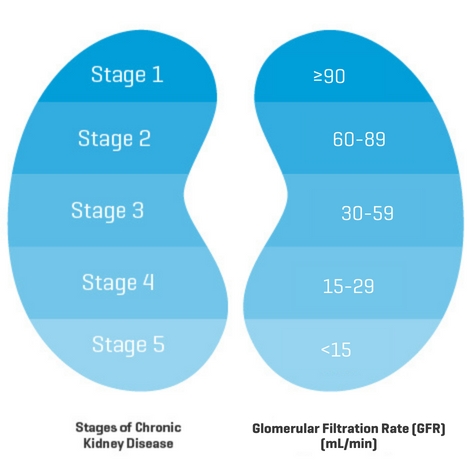Chronic Kidney Disease (CKD) Stage 4
Chronic kidney disease (CKD) is a condition in which kidney function declines gradually over time and can possibly lead to kidney failure in some patients. At CKD stage 4, there is advanced kidney damage, with a high risk of progression to kidney failure. There would need to be discussions and planning for dialysis to replace kidney functions.
An overview of stage 4 chronic kidney disease

Chronic kidney disease (CKD) is divided into 5 stages based on kidney function and whether there are signs of blood or protein in the urine.
At CKD stage 4, your kidneys are severely damaged, and there is a substantial decline in kidney function, leading to toxin and fluid build-up in your body. A blood test to determine kidney function at this stage would give an estimated glomerular filtration rate (eGFR) of 15-29 ml/min. You would likely be experiencing symptoms from CKD, as well as other health issues such as anaemia caused by CKD. This is a critical phase for understanding the need for replacing kidney function and what your options may be.
Symptoms of stage 4 chronic kidney disease
The signs of kidney disease generally start appearing at stage 3, but sometimes they do not appear until stage 4. During stage 4, symptoms are more common and may worsen whilst kidney function declines further.
The symptoms of CKD stage 4 may include:
- Fatigue
- Shortness of breath
- Swelling in your hands and feet
- Puffy eyes
- Change in urine colour or volume
- Muscle cramps
- Poor appetite
- Nausea and bad taste in the mouth
- Trouble sleeping
- Itch
- Discolouration of nails and skin
Symptoms may vary between people. It’s important to be aware of all the symptoms of CKD so you can discuss with your doctors if you are experiencing any.
Treatment for stage 4 chronic kidney disease

Treatment for CKD stage 4 is focused on treating health issues caused by impaired kidney function, slowing down the progression of CKD, and exploring the need for kidney replacement therapy. During this stage, your regular doctor should refer you to a kidney specialist, also known as a nephrologist, to oversee your care in the long run. Based on an assessment of your overall condition, your nephrologist will discuss with you and start planning for potential kidney replacement therapy (dialysis and transplantation) if you progress to CKD Stage 5, commonly known as kidney failure or end-stage kidney disease.
Managing stage 4 chronic kidney disease (CKD)

Managing your kidney disease to slow down its progression is critical at CKD stage 4. In addition, treatment will be focused on the complications caused by CKD, such as anaemia and metabolic bone disease. At this stage, it is also important to focus on maintaining fluid balance to avoid fluid build-up in your legs or lungs.
Other recommendations include making changes to your diet, moderate exercising, stopping smoking, limiting alcohol consumption, maintaining a healthy weight, and monitoring other health conditions, such as high blood pressure or diabetes.
The prognosis for stage 4 chronic kidney disease

At CKD stage 4, your kidneys are severely damaged, and overall kidney function has substantially declined. However, it is still possible to slow down the progression of CKD and manage other potential health issues by following your healthcare team’s recommendations.
It is essential to know that depending on your overall condition and the decline in kidney function, your healthcare team will start planning kidney replacement therapy options for when you progress to stage 5 of chronic kidney disease, also known as end-stage kidney disease.
Talking about kidney replacement therapy

Your nephrologist and other multidisciplinary healthcare team members will start assessing your overall condition and giving you information about kidney replacement therapy. They will discuss the available treatment options and want to hear your views about how they would fit your lifestyle and preferences. You should fully understand the different options and think carefully about which would work best for you. At the end of that process, you and your nephrologist will decide on the best treatment option for you.